Deicer Motion Controls Case Study
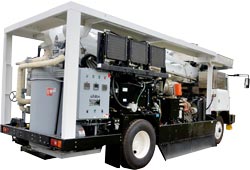
The Chinook Mobile Hydraulic Deicer during testing at our York, PA facility.
Who: Chinook Mobile Heating & Deicing Corporation in Ontario, Canada
What: Design, install and program the hydraulics and motion controls to maintain the deicer boom position.
Where: Assembly, fabrication and preliminary testing in York, PA. Additional testing and fine tuning at Chinook’s’ facility in Ontario, Canada.
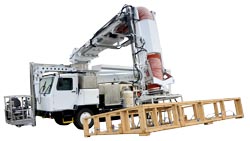
The wood frame is a mockup of the deicing delivery head used for testing and programming.
When: Advanced Fluid Systems began working with Chinook MHD in 2009. Over the next two years we worked closely with Chinook at our York, PA facility including a 6 month period when Chinook employees from Canada worked on the prototype vehicle in York.
Why: Chinook’s ambitious deicing vehicle uses a non-glycol environmentally friendly technology for deicing planes before takeoff.
Challenges and Solutions
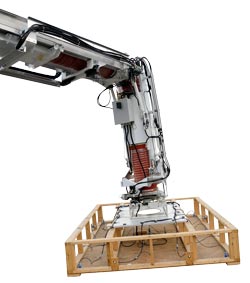
Advanced Fluid Systems’ custom algorithm allows the boom operator to engage a distance and alignment control system that automatically maintains the hover distance and alignment of the delivery head. The system manipulates the gimbals pitch and roll positions, as well as the jib angle and boom extension length, even while the vehicle and operator are simultaneously moving.
Challenge: Anti-Collision Algorithms – While operating the deicing head, prevent the boom operator from damaging the aircraft or deicer.
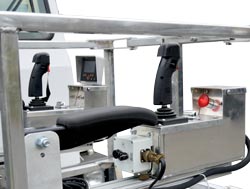
The external operator controls included a 2.8″ color display, two four-axis joysticks and programmable toggle switches.
Solution: Using IFM Efector mobile controllers, Hawe proportional valves and 21 ultrasonic sensors, Advanced Fluid Systems developed two custom algorithms to prevent the operator from moving the delivery head into the plane or deicer platform.
The deicer boom’s 10 independent axes of motion give the operator full range of motion within the anti-collision envelope. When a potential collision surface is sensed, continued motion in the direction of the obstruction is prevented, while controls that move the aerial device away from the collision surface remain available.
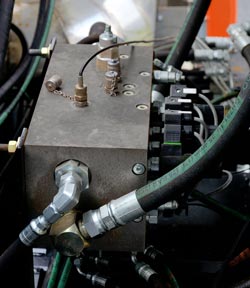
A custom hydraulic manifold from Sun Hydraulics controls the fan drive motor, circulation motor, water pump motor, blower motor and fuel pump motor.
A “supervisory” control system, hardwired independently of the software control system, prevents the boom from colliding with the operator and prevents the operator lift from moving while the boom is positioned over the operator. The supervisory control system also controls the hydrostatic drive system of the vehicle to creep speeds while the boom and operators lift are deployed for deicing operations.
Challenge:Machine Integration – Thermal fluid, hydraulic boom and hydraulic power controls needed to seemlessly integrate into the LCD and joystick user interfaces.
Solution: AFS engineers used the CANOpen protocol to integrate (192) I/O’s with the help of 3 PLC’s, (2) color LCD displays and (2) four-axis joysticks.
The deicer thermal fluid controls operate an environmental friendly steam system used to remove ice from aircraft. Sensors and components connected to the CANOpen network and 7″ cab display (pictured) include:
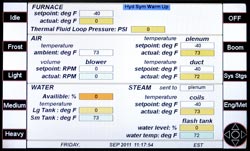
Advanced Fluid Systems installed and programmed a 7-inch color display in the cab to for the heat system operation and aerial monitoring.
- (9) Temperature transducers
- (3) Pressure transducers
- (2) Tank level transducers
- (7) Liquid presence sensors
- (1) Optical proximity switch
- (1) Water transfer pump
- (2) Hydraulic-actuator operated valves
- (5) Electric servo valves
- (2) Proportional hydraulic valves
The deicer boom controls provide the 10 independent axes of control for the boom arm and deicing head. Two joysticks control the deicer head and operator basket position while the two LCD displays allow for user input and device monitoring for both the operator and driver. The deicer boom controls consist of:
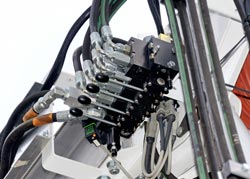
Hawe electo-hydraulic PSV valves consisting of 10 valve sections in 2 groups controlled the 10 independent axes of motion.
- (2) Hawe Electro Hydraulic proportional control valves including one six-section and one four-section assembly.
- (2) Four axis joysticks with operator toggle switch that provides 9 independent axes of aerial motion.
- (2) 4..20mA analog string pots.
- (1) 4..20mA linear displacement transducer.
- (1) J1939 200 turn absolute rotary encoder.
- (4) CANOpen absolute magnetic encoders.
- (21) Ultrasonic transducers.
- (1) Temperature and humidity sensor.
- (2) Electrical linear actuators.

